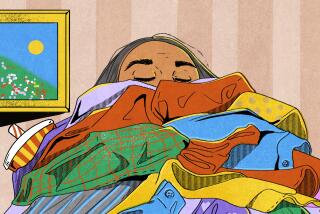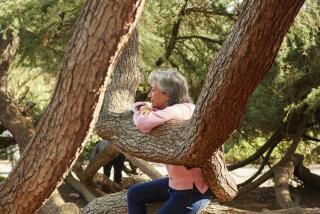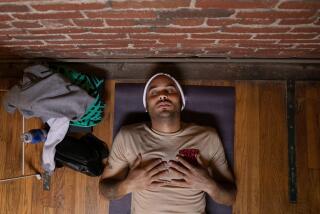Son finds new life rhythm after parents’ deaths
- Share via
Larry Graber, a Santa Monica psychotherapist whose parents died within six months of each other in 2000, has made his parents’ deaths a very conscious point of departure for a journey of self-discovery and improvement.
As second-generation Jewish immigrants, Graber’s parents were frugal and had worked their way into the upper middle class by running pawn shops. Becoming a psychotherapist and living openly as a gay man, Graber had challenged many of their expectations. But he never stopped wanting to please them. He too worked hard and lived modestly, struggling to meet what he thought were their expectations of what he could accomplish. And when they became critically ill, Graber tended to them devotedly. For more than two years, he shuttled almost daily to nursing homes, hospitals and their home in Encino to oversee their care.
Tending his parents at their most vulnerable, Graber said, allowed him to understand that they accepted him as he was and wanted only for him to be happy. Other positive changes came after their deaths, when Graber decided to take several months away from work to grieve and sort out his parents’ affairs. Having played drums as a child, Graber wandered one day into the workshop of Remo recreational music center in North Hollywood. He struck up a conversation with the owner, who had a long-standing interest in the use of drums and rhythm instruments as a mode of comfort and healing.
Graber went home to his parents’ house that day with a djembe drum -- a style of rhythm instrument long used by medicine men in West Africa. He found the rhythms he beat both soothing and energizing, and in the months that followed, many more drums came home with him from Remo’s workshop.
Six months after he became an orphan, Graber was asked by a fellow therapist if he would bring his drums to a retreat for family caregivers of the elderly -- people doing what he had done for his parents. Leading stressed-out caregivers in a session of group drumming, Graber said he found new purpose in his life. His growing personal passion for rhythm became united with his long-standing professional commitment to psychotherapy.
Now, Graber’s “drum circles” are among the most highly rated activities at caregiver retreats run by the Los Angeles Caregiver Resource Center. Graber hopes to expand his practice of rhythm therapy and build on research that suggests it can lower blood pressure and improve immune function.
“I definitely feel physical benefits from it,” Graber said. “And it’s wonderful to work with people who haven’t been able to rest well.” The drum circle “stimulates your thinking in a calm way, and afterward, you feel like you can rest.”
Freed of his parents’ likely disapproval, Graber also says he has changed his approach to pursuing some of his passions. When he decided to buy a motorcycle, he decided not to compromise (the way his frugal parents would have done) by buying a cheaper copy of the one he really wanted. Instead, he splurged and bought the high-end one.
“Now that my parents are dead, it’s just one more indicator that there’s no reason for me not to live the life I want,” Graber said. “Because it doesn’t go on forever. The people I have in my life, the things I do with my life, the things I do for myself . . . there’s no reason to do things halfway.”
More to Read
Sign up for Essential California
The most important California stories and recommendations in your inbox every morning.
You may occasionally receive promotional content from the Los Angeles Times.











